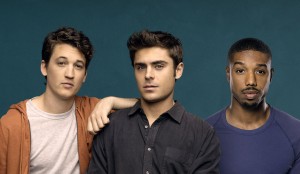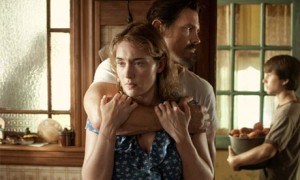
A cast of exceptionally appealing performers and some very funny lines are not enough to make this raunchy comedy overcome its essential charmlessness. At its heart, it wants to be a romantic comedy, a chick flick from the perspective of the guys. But even Zac Efron, Miles Teller, and Michael B. Jordan cannot make us wish these guys on anyone, and especially not on Ellie (Imogen Poots) and Chelsea (Mackenzie Davis).
Best bros/ladykillers Jason (Efron), Daniel (Teller), and Mikey (“Fruitvale Station” breakout Michael B. Jordan) make a pledge to avoid entanglements of the romantic kind and devote themselves to a “roster” of willing lovelies, kicking to the curb any woman who has the temerity to start a sentence with “So.” “So,” it seems, never leads to anything good. It is always the precursor to some version of “where do you think this is going?” If it is supposed to be endearing that Jason’s response to a “So” conversation from a woman he has been having sex with for six weeks is an internal “I didn’t know we were dating” while he comforts her with a variation of “It’s not you, it’s me,” it fails to persuade us. “I’m not even close to the guy you need, the guy you deserve,” he comforts her as he escorts her to the door.
Brief interruption for an important message: Guys, if you sleep with someone, it is likely that she thinks you’re in a relationship. Ladies, unless you don’t care whether you’re in a relationship or not, don’t sleep with him until you have a relationship first. And if you are looking for someone who has a bed frame and does not drink coffee from a cereal bowl, then check those things out before you go to bed with him.
Mikey gets dumped by his wife, who tells him she is having mind-blowing sex with her lawyer, who, according to Mikey, looks like Morris Chestnut. A repeated joke that white people do not know who Morris Chestnut is will not make sense to those who are fans of the handsome actor or those who do not know his work.
Jason and Daniel, who work together illustrating book covers, decide that the best way to comfort the devastated Mikey is to make a promise that they will sleep with a lot of women and not get emotionally entangled. As has been true ever since before Shakespeare, this pledge is always immediately followed by meeting an irresistible woman.
Daniel has been relying on his gal pal Chelsea to act as his wingwoman, though her role is limited to some mild banter interspersed with the highly unoriginal tactic of complimenting pretty women’s shoes and then turning her over to Daniel with some outrageous lie intended to capture their interest and sympathy (“he’s a virgin”).
Jason meets a smart, pretty girl named Ellie at a bar, has sex with her, and then concludes, based on the flimsiest of evidence, that she is a hooker (his term), despite the fact that she didn’t make any effort to negotiate payment. So, he dashes out while she is asleep, only to find, in a highly unoriginal “Top Gun”/”Grey’s Anatomy” twist, that she is a client of his firm and he is supposed to impress her.
And Mikey tells the guys he is pursuing a girl he met in the bar, but in reality he is pursuing the wife who asked him for a divorce.
The ups and downs of these relationships are thin at best and most often icky and crass. Another plot development seems lifted from the vastly superior “High Fidelity.” And another asks us to find theft and deception endearing. The female characters are underwritten male fantasies — easily seduced, easily placated, undemanding, and with mad Xbox skillz. Even the big public apology that is the very hallmark of a chick flick is unimpressive. What people seem to miss is that if a raunchy comedy is supposed to be romantic, the worst of the raunch has to be by proxy with the least sympathetic character, as in “American Pie.” This movie is not even close to the one we need, the one we deserve.
Parents should know that this movie is extremely raunchy, with explicit sexual references and situations, some graphic images, and brief pharmaceutical abuse.
Family discussion: What scares Jason about the “so” sentences? Why were the guys afraid to tell each other the truth? Why did Chelsea spend so long acting as wing woman?
If you like this, try: “Going the Distance” with Drew Barrymore and Justin Long
is, as its title suggests, a deeply romantic story about a teenager utterly swept away by a love that consumes him, and ultimately everyone around him. When the girl’s father says he cannot see her, he becomes completely obsessed, with tragic results. The 1981 movie starred Brooke Shields, but it is not as well remembered as its Diana Ross/Lionel Richie theme song.


